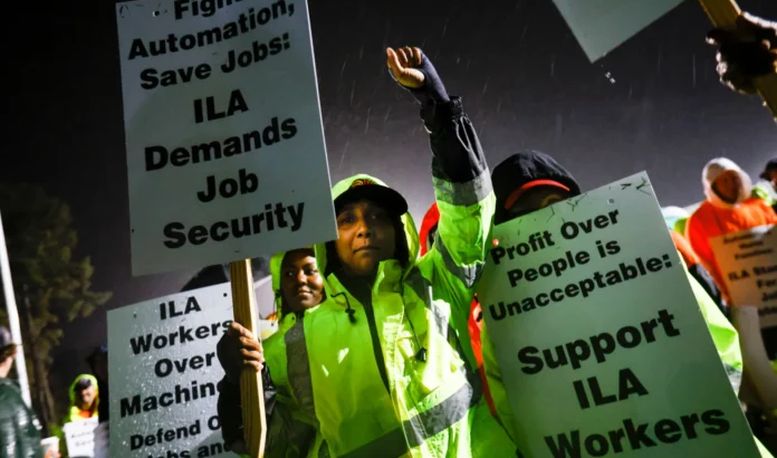The International Longshoremen’s Association (ILA) has kicked off a strike which will see a massive disruption of the shipping industry and freight across the country. The union, with 47,000 members, saw its contracts expire for the East Coast and the Gulf Coast today, signaling the start of the strike.
Major ports are shut down, at Boston, New York/New Jersey, Philadelphia, Wilmington, NC, Baltimore, Norfolk, VA, Charleston, SC, Savannah, GA, Jacksonville, FL, Tampa, FL, Miami, New Orleans, Mobile, AL, and Houston. This means 6 out of the 10 busiest ports across the country have ground to a halt with nearly 50% of container shipping now having no port of call.
This is part of a wave of strikes spurred on by high inflation cutting into workers’ paychecks while their bosses make record profits. This includes UAW auto workers, who won a historic strike against the Big Three automakers last year, and IAM machinists at Boeing who build planes in the Pacific Northwest, who are currently on strike after 16 years without a new contract.
The strike by the ILA is the first significant strike for the union since 1977. It will clearly have massive ramifications for the looming presidential election, not least because most estimates indicate that the strike would cost the US economy $1 billion a day.
There will be massive pressure on both the union leaders and the industry bosses to reach an agreement, but so far an immediate deal seems unlikely.
Class Struggle On The Ports
The ILA, historically the more conservative of the two US longshore unions, has often shied away from direct action, including strikes. Contracts have been routinely negotiated behind closed doors, with little ability for the membership to intervene. But this time around, a number of factors are pushing the union to a greater level of militancy.
Automation has become a serious threat to longshore workers, with ports across the world stripping jobs in favor of greater automated machinery. This was ostensibly the cause of contract negotiations breaking down in June when it became apparent that bosses in Mobile, Alabama had automated the process of trucks coming in and out of that port.
This is playing out at a time of record profits for the industry. Workers see these massive profits going to the bosses and are rightly looking to fight for a raise to catch up with inflation.
The union is aiming for an 80% pay increase over the next 6 years. The major port companies originally offered a number closer to the 32% won by the West Coast International Longshore and Warehouse Union (ILWU) workers last year. Yesterday, at the final hour, the port companies apparently upped their offer to a nearly 50% wage increase with higher contributions to healthcare and retirement funds. Again however the union rejected their offer stating that it didn’t meet members needs around wages and protections from automation.
If the union follows through with a fight and wins its demands, it would be one of the most significant contract wins for US workers in decades. It would be part of the process of major wage gains made by workers across the country recently, including UAW auto workers last year.
There is a lot that makes victory a possibility. A perfect storm has come together to place transport and logistics workers in a particularly strong position. Houthi rebel attacks on shipping have massively disrupted cargo heading through the Suez Canal, meaning ships are forced to redirect traffic through the Cape Route, passing the southern tip of Africa—a significantly longer journey.
On top of this, traffic through the Panama Canal has been hampered this year due to drought, especially late last year where the number of ships able to cross the canal almost halved.
There are also a number of local factors in North America which are giving workers serious bargaining power. The expectation of new tariffs on Chinese goods means retailers are desperate to stock up before the election. Just-in-time production processes, with low inventory, also heighten concerns about a strike or other disruptions that affect shipping. This includes so-called Precision Scheduled Railroading which dramatically reduces the workforce and inventories on the rail network in an attempt to boost profits. This will only aid the ILA strike as rail networks in North America have even less capacity to make up for disruptions at the docks. Retail and manufacturing, particularly the auto industry, will be hit hard from a protracted strike, and this would have massive knock-on effects for the entire US economy.
A Wrench in The Election
Adding to all this, the strike will pose a major disruption to the presidential election.
The logistics industry has become a minefield for the Democrats. Biden has tried to present himself as the “most pro-union president in American history”, but in dealing with the logistics industry, the Democrats have exposed their politics by rushing to defend the bosses.
Under Biden’s direction, politicians from both major parties, including self-described progressives in “The Squad”, voted to break the possibility of a railway strike in 2022. Workers were forced into a weak contract, measly wage increases, and 1 day of paid sick leave instead of the 15 they originally demanded.
In response, right-wing politicians have attempted to cash in by posturing as pro-worker in contrast to the Democratic party. The betrayals by the Democrats have made it easier for Trump to sweep his anti-labor credentials under the rug and instead disguise his protectionist trade and manufacturing policies as pro-worker. However, protectionist measures from both parties have always been about defending US corporations, leaving workers to suffer the fallout.
Like the rail unions, dock workers have been sold down the river by the major parties. On the West Coast the ILWU in both Canada and the US has faced government intervention seeking to pressure or even force workers to accept sub-par contracts.
Julie Su, as acting Secretary of Labor under Biden, pushed a deal on the ILWU on the US West Coast in 2023 for a 32% pay increase, less than half as much as the ILA is fighting for today.
Harold Dagget, the ILA president, met with Trump late last year, claiming that the two have enjoyed a “long relationship” over the years. This is reminiscent of Teamsters President Sean O’Brien’s decision to speak at the Republican National Convention in July. While the Democrats have shown their true colors under the Biden/Harris government, union leaders playing ball with the Republicans will win no favors for organized labor.
Both major parties will stand against workers and back their friends in big business every step of the way. The Teamsters and the ILA should be looking outside of the Democrats, but not to the right. If the major parties are both looking to sell out workers year after year, the union movement should be drawing the conclusion that neither party represents ordinary people. Unions should be looking to organize their own political power, instead of clinging to the coat strings of the major parties.
An important step in this direction would be to build solidarity with existing movements of workers and young people. During this strike, the union leadership has pledged to keep servicing oil and gas, passenger ships but notably also weapons material entering and leaving the US. As climate change, and notably Hurricane Helene, devastated the lives of working-class people across the South East, pledging to unconditionally keep oil flowing points in the wrong direction.
More pressing though, is the growing threat of war across the world. In a statement released by the union the ILA leadership reaffirmed its pledge that “ILA Also Means Love America” and that they would honor their union’s century old “No Strike Pledge” in handling U.S. military cargo at all their ports.
This builds bridges in the wrong direction, instead sowing illusions in the US military at a time when millions are joining movements for peace and standing against war in Ukraine and Gaza. Port unions, the world over, have at different times played key roles in shutting down the military machine by refusing to allow the flow of arms at times of war. Spanish dockworkers just announced a 24 strike in opposition to the Israeli state’s assassinations in Lebanon. Going out of your way to allow US military arms shipments is a missed opportunity to build links with workers and young people fighting the same political establishment and similar corporations who oppose the ILA now.
Threat Of Government Intervention
Longshore workers, as the “heavy battalions” of the working class, have disproportionate power in their ability to bring the economy to a halt. The ruling class is aware of this, and will do whatever they can to stop the strike. But the reality is, if dock workers stand up to pressure from the bosses with militant, escalating action that mobilizes the entire membership, they can win big.
There simply are not thousands of skilled scab longshore workers who are able to strike-break and take union jobs. This is a high-risk industry that requires tremendous training and time on the job. Workers have incredible power if they hold their own against anti-labor laws.
Along with all of the disruption in world trade and massive economic pressure, this strike, in the build up to the upcoming elections places workers in a strong position. Harris will be under massive pressure to avoid the economic fallout of a labor dispute on the docks.
The Democrats also will not find themselves with an easy avenue like the Railway Labor Act to force workers to accept a weak contract. There are other means they could use to strike a deal between the ILA leadership and big business in the ports, but forcing workers back on the job through legislation would require much more controversial means than we saw with the blocking of the rail strike.
The Taft-Hartley Act, for instance, can allow the government to prevent a strike if it is claimed to be a “national emergency.” This has been used by Republicans in the past to stop strikes on the docks but it would be seen as a massive escalation for the Democrats to use this law.
With all the pressures to back down from strike action, ILA members will have to push to escalate the strike and win the demands they deserve. It’s a huge step forward that the current leadership is willing to actually strike. It’s crucial that workers on the picket lines are updated on any negotiations and allowed to democratically discuss developments. In the past, a lack of rank-and-file engagement has led to the current reality that ILA workers make half what the ILWU does.
To leverage the full power of the union, it will be crucial to shut the ports down completely during this strike. There is already a strong culture of solidarity that has survived on the waterfront with dock workers refusing to unload cargo originally destined for a port in the middle of a strike.
For instance, when the Canadian ILWU was on strike, workers south of the border refused to unload ships originally destined for Vancouver ports. The leaders of the ILA must call on their West coast counterparts and those north of the border to refuse to unload East coast-bound cargo.
The ILA leadership should also call mass pickets and rallies, inviting workers across industries to participate. If the government moves in to crush the strike, it is up to the wider labor movement to come out in their defense, up to and including solidarity strikes, especially if the Taft-Hartley act is used. A strong contract for ILA members would put workers across all industries in a better position to fight for more!
Power To The Workers!
While US ports are for the most part publicly owned, they are privately run by shipping and logistics companies that will do everything in their power to maximize their profits at the expense of ordinary people dealing with the rising costs of basic goods.
The drive of big business to crush organized labor is baked into capitalism. ILA members are at a key junction in history where they can show the way to a workers’ movement by standing firm and fighting to win big against the onslaught of big business. Solidarity with ILA longshore workers!



